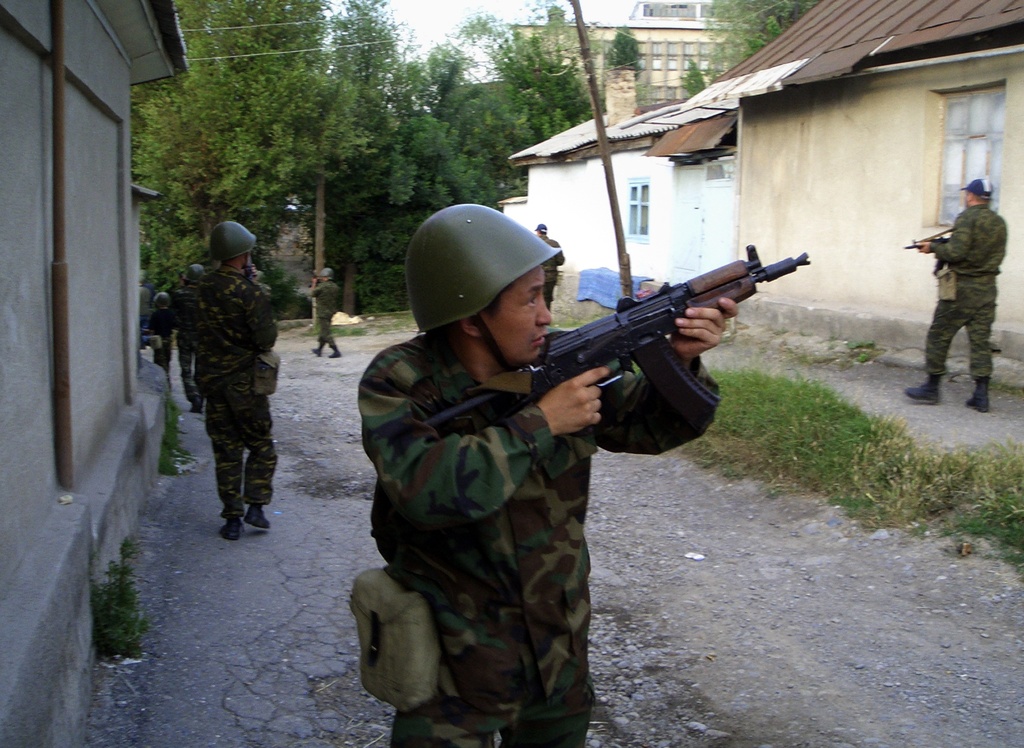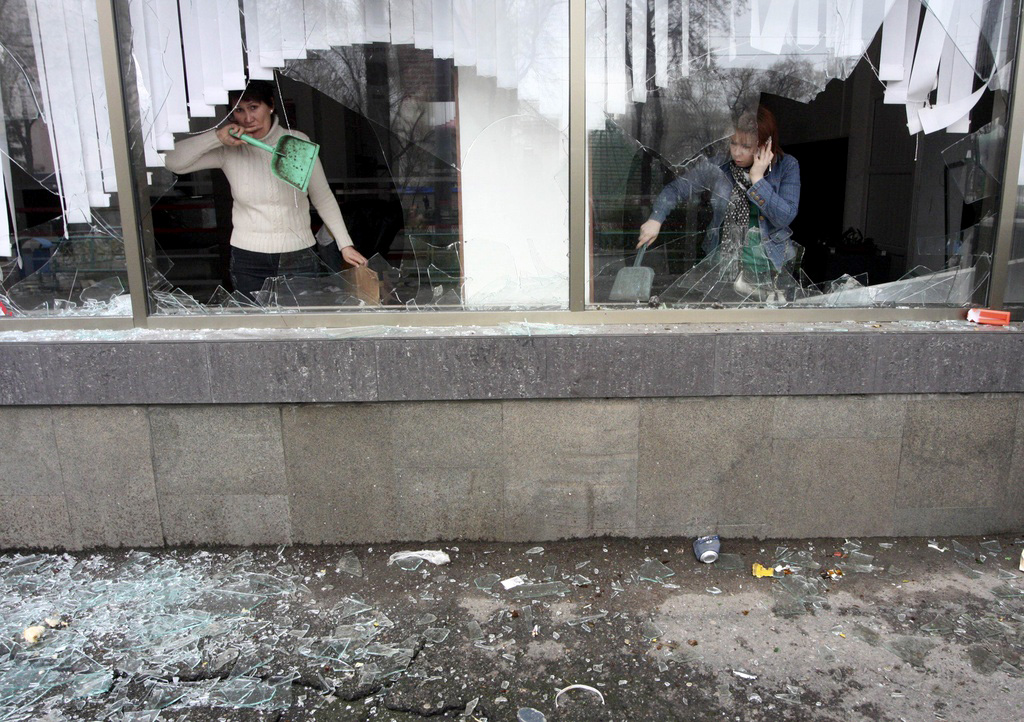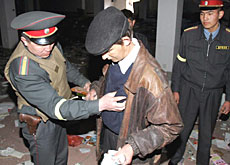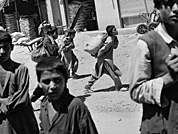Ethnic problems blamed for Kyrgyzstan violence

As rioting engulfs the southern part of Kyrgyzstan, a Switzerland-based expert on Central Asia tells swissinfo.ch about the bloody history behind the latest violence.
Stephen Aris from the Centre for Security Studies at Zurich’s Federal Institute of Technology also explains why socio-economic factors – as well as ethnic ones – play a central role.
Rioting in the southern part of the impoverished Central Asian nation has left the country’s second-largest city, Osh, in ruins and sent tens of thousands of Uzbeks – who make up 15 per cent of the country’s 5.4 million inhabitants – fleeing toward the border with Uzbekistan.
In the deadliest ethnic clashes in Kyrgyzstan in 20 years, witnesses said gangs armed with automatic rifles, iron bars and machetes set fire to houses and shot fleeing residents.
A Reuters reporter said Osh appeared considerably calmer on Tuesday but the atmosphere remained tense.
The clashes, which began on Thursday night and escalated over the weekend, have fuelled concern in Russia and the United States, both of whom operate military air bases in the strategic but volatile nation west of China.
swissinfo.ch: What is the background to the violence in Kyrgyzstan?
Stephen Aris: One of the most notable things is the lack of clear information, but it seems to be organised along the lines of ethnic groups – between the minority Uzbek population of Osh and the Kyrgyz population of Osh.
Ethnic tensions in the Osh are not new. In 1990 there were clashes [over land ownership] before the end of the Soviet Union, but since then there has been a relatively peaceful period. However, following the removal of Bakiyev from the presidency in April, tensions have been simmering and at times boiling over.
swissinfo.ch: Why did the Tulip Revolution of 2005 wilt so badly?
S.A.: The outcome of the Tulip Revolution was the replacement of [former president Askar] Akayev with Bakiyev, but Bakiyev himself came from within the existing elite structures and soon became tainted by corruption, similar to his predecessor.
swissinfo.ch: Who are the victims?
S.A.: It seems people are being attacked on both sides. There are eyewitness accounts from Uzbeks claiming that Kyrgyz are entering Uzbek areas and indiscriminately killing – and vice versa. However, it appears that the Uzbek community may be feeling the consequences more, with a large-scale flow of ethnic Uzbeks to the Kyrgyz-Uzbek border seeking refuge in Uzbekistan.
Alongside the fact that there are different ethnic groups, tensions are also based on socio-economic disputes: the Uzbeks feel as though they’re treated as second-class citizens to a degree – all political positions are held by Kyrgyz. And on the other side the Kyrgyz feel the Uzbeks have a disproportionate control over economic opportunities in Osh, particularly because, as farmers, they control a lot of the markets.
There is a feeling generally in the south of Kyrgyzstan, among both Uzbeks and Kyrgyz, that most of the wealth goes towards the north of the country. This [violence] can be seen as the outcome of such resentment in the political vacuum created by the removal of Bakiyev in April.
swissinfo.ch: Some people have blamed Stalin’s divide-and-rule strategy for the Fergana Valley, where most of the violence has taken place, in the 1920s. Is it all Stalin’s fault?
S.A.: The argument is that Stalin arbitrarily drew lines on a map dividing the Central Asian population into different Republics, which have now, with the collapse of the Soviet Union, become nation states. Indeed, this has created a situation in which you can find significant minority ethnic populations in many Central Asian countries. Kyrgyzstan is roughly 15 per cent ethnic Uzbek, with the Uzbeks predominantly located in one area: around Osh.
However, these borders and the composition of the population have been the same since the 1920s, so I don’t think it can be called a key cause here.
At the moment reports are that the north is relatively stable. Bishkek, the capital, is supposed to be functioning as normal.
swissinfo.ch: Could violence spread to other regions?
S.A.: There are concerns that it could spread to neighbouring Uzbekistan or Tajikistan, but at the moment it doesn’t seem viable to claim that this is likely.
swissinfo.ch: The government in Bishkek appears to have lost control. Is outside intervention the only option?
S.A.: The interim government of Roza Otunbayeva has more or less admitted that they are not in a position to bring about a solution on their own. They have requested Russian assistance and have also asked for humanitarian assistance from all sources.
swissinfo.ch: On Tuesday the Russian-led Collective Security Treaty Organisation (CSTO) said it would not fulfil Bishkek’s request for the immediate dispatch of peacekeeping forces.
S.A.: The position of the CSTO is consistent with that of Russia, which has been that it’s a domestic dispute and therefore it does not have the right to intervene. The CSTO recently created rapid reaction forces, but the purpose of these forces is to defend its member states against external attacks from either another state or a non-state actor.
swissinfo.ch: How about the United Nations or the OSCE (Organization for Security and Co-operation in Europe)?
S.A.: I would imagine that Russia would be particularly happy for the UN to be involved given Moscow’s view that the UN should play a greater role in international affairs. The OSCE is also a possibility because Kazakhstan currently has the chairmanship of the organisation and they helped negotiate the safe departure of Bakiyev from Kyrgyzstan. So it’s possible that the OSCE could play a reasonably prominent role in this situation.
swissinfo.ch: On Tuesday Otunbayeva said a national referendum on a new constitution would go ahead on June 27 despite the violence. How likely is that?
S.A.: It’s difficult to imagine how an effective vote can take place at the moment, seeing as the interim government doesn’t seem to hold effective authority over large sections of the country. However, this does not mean that the interim government will not go ahead as planned.
Thomas Stephens, swissinfo.ch
Population: 5.41 million
Size: 199,951 sq km (more than four times the size of Switzerland)
Life expectancy: 69.4 years old
GDP: $5.06 billion
GDP per capita: $934.40
Inflation: 21.21%
Unemployment: 18%
Major religion: Islam (65.1%)
Swiss exports: SFr11.4 million
Swiss imports: SFr5.5 million
Kyrgyzstan’s interim government, which took over when former President Kurmanbek Bakiyev was ousted in an April uprising, has accused Bakiyev’s family of instigating the violence to halt a June 27 referendum on a new constitution.
Uzbeks have mostly backed the interim government, while many Kyrgyz in the south have supported Bakiyev, who had risen to power in the “Tulip Revolution” of 2005. Bakiyev, currently in self-imposed exile in Belarus, has denied any ties to the violence.
About 55 Swiss nationals are registered with consulates in Kyrgyzstan. Switzerland recognised the country in December 1991, less than three months after declaring its independence following the collapse of the Soviet Union.
Swiss projects in Kyrgyzstan have been temporarily suspended due to the unrest. The foreign ministry said its work has not “theoretically” been called into question.
Switzerland has been active in Kyrgyzstan with development aid since 1994. The country is part of a priority region, along with Tajikistan and Uzbekistan. Switzerland represents them at the World Bank and International Monetary Fund.
Swiss involvement in Kyrgyzstan is a joint effort between the Swiss Agency for Development and Cooperation (SDC) and the State Secretariat for Economic Affairs (Seco). SDC supports projects in the law, energy and private sector, particularly in water management. Seco and SDC, an arm of the foreign ministry, have invested around SFr15.5 million in Kyrgyzstan.

In compliance with the JTI standards
More: SWI swissinfo.ch certified by the Journalism Trust Initiative





You can find an overview of ongoing debates with our journalists here . Please join us!
If you want to start a conversation about a topic raised in this article or want to report factual errors, email us at english@swissinfo.ch.